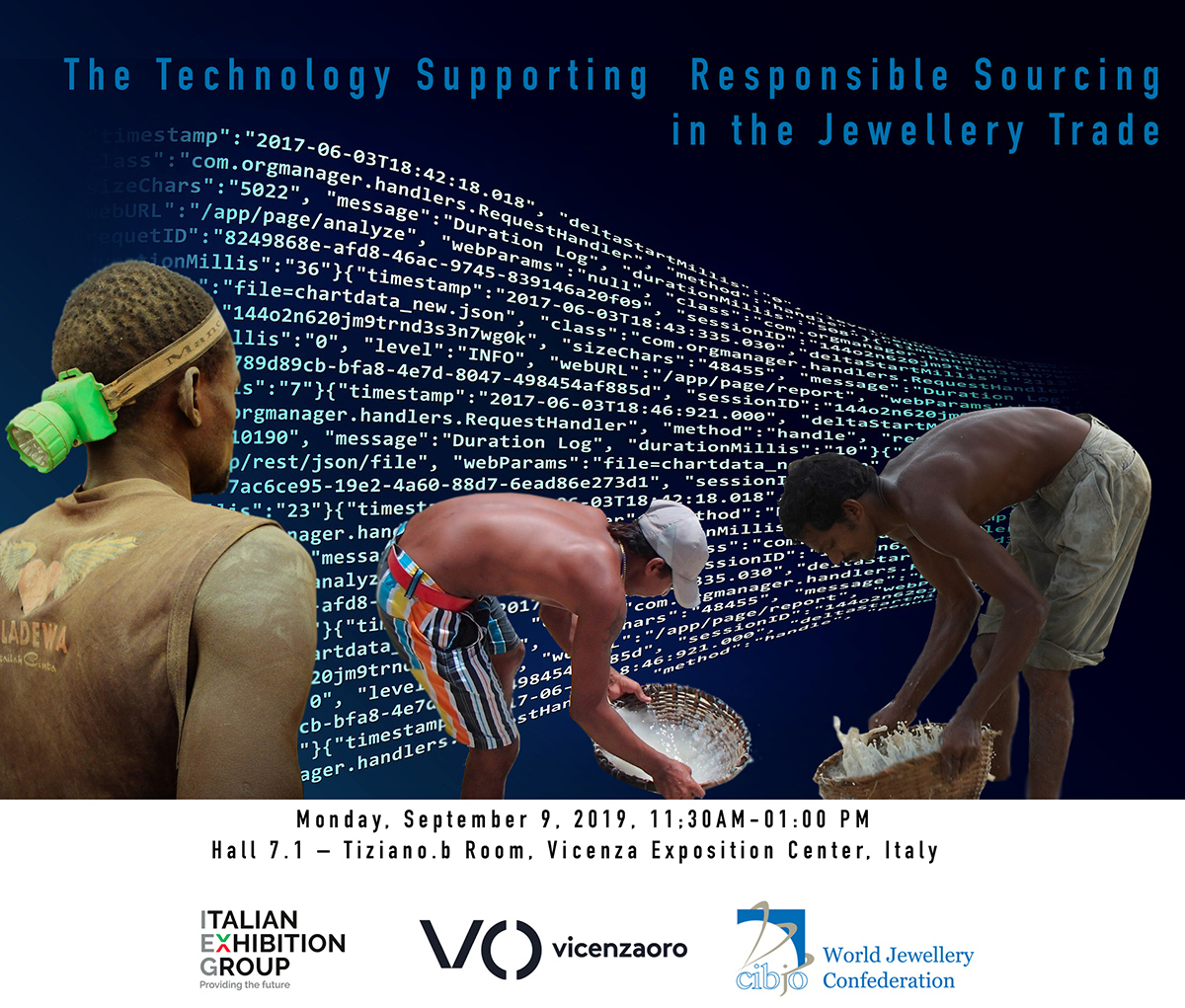With members of the jewellery and gemstone sectors under growing pressure to actively demonstrate that they are conducting their businesses in a sustainable manner, including verifying that the items they purchase, process and sell have been sourced responsibly, a range of technological solutions are currently being developed to help them comply with the due diligence requirements. These came under the spotlight during a seminar on September 9, 2019, at the VICENZAORO show in Vicenza, Italy, organized by CIBJO and hosted by the Italian Exhibition Group (IEG).
The seminar was the latest edition in a series of educational programmes organized by the two bodies, which is endorsed by the United Nations Economic and Social Council (ECOSOC), to support Corporate Social Responsibility and sustainability in the jewellery sector. As, Marco Carniello, Director of IEG’s Jewellery and Fashion Division, pointed out, the seminar this September marked the 10th year of cooperation between CIBJO and Italy’s leading jewellery trade show organizer.
A growing percentage of the jewellery, gemstone and precious metals industries have taken steps in recent years to implement sustainable and responsible sourcing principles in their businesses, with more than 1,300 worldwide already certified by compliance organisations, after undergoing monitoring by independent auditors.
But in an industry that is dominated by small and medium-sized companies, many participants find it challenging to follow suit and consequently could experience difficulty in gaining access to chains of supply. The technologies discussed at the seminar are largely being developed to address these challenges.

Marco Carniello (left), Director of IEG’s Jewellery & Fashion Division, and Gaetano Cavalieri, CIBJO President, opening the seminar in Vicenza on September 9, 2019.
“CIBJO is committed to the development of an ethical and sustainable jewellery industry, which sources its raw materials in both a responsible and transparent manner,” said CIBJO President Gaetano Cavalieri, opening the seminar. “As we reiterated in the new Responsible Sourcing Blue Book which was approved earlier this year, we believe that all participants should do due diligence to the best of their ability. At the same time, we also insist that no ethical members of our community be discriminated against because they currently lack the resources necessary to implement a full compliance system. It is for this reason that we view the development of technological solutions as being so important.”
The panel of speakers, which was moderated by Erik Jens, vice president of CIBJO’s Responsible Sourcing Commission, represented a cross section of this growing industry service sector, providing solutions to industry participants at all stages of the chain of distribution, from the mine to the retailer.

Marco Carniello, Director of IEG’s Jewellery and Fashion Division, opening the CIBJO-IEG seminar at the VIZENZAORO show on September 9, 2019. He is joined on the podium (from left)by: Erik Jens, Vice President of CIBJO’s Responsible Sourcing Commission and the seminar moderator; Michillay Brown, Tracr; Assheton Stuart Carter, The Dragonfly Initiative; Daniel Nyfeler; Gübelin Gem Lab; Konstantin Born, GemFair; Francesca Marino, CIBJO; and Mark Hanna, Richline Group.
PRESENTATIONS

Michillay Brown, Industry Transformation, Tracr, United Kingdom
Ms. Brown introduced the De Beers-developed blockchain-powered traceability platform, which uses cutting-edge technology to connect the diamond supply-chain and provide provenance, traceability and authenticity for the diamond industry.


Dr. Assheton Stuart Carter, The Dragonfly Initiative, United Kingdom
As head of the sustainability advisory firm, Dr. Carter and his team are currently developing a suite of online due diligence tools that will be made available free of charge to the jewellery and gemstone industry, as a part of a joint initiative by CIBJO and the Coloured Gemstone Working Group, which Dragonfly facilitates.
Dr. Daniel Nyfeler, Managing Director, Gübelin Gem Lab, Switzerland,
Dr. Nyfeler presented the Gübelin Gem Lab’s Provenance Proof project, a gemstone paternity programme that uses virtually undetectable nano-particles which are embedded in a gemstone, containing identifying information to verify its origin, and then blockchain technology to communicate its provenance through the chain of distribution.


Konstantin Born, Business Development Manager, GemFair, United Kingdom
Mr. Born described the De Beers’ pilot project that aims to create a secure, transparent route to the market for ethically-sourced artisanal and small-scale mined diamonds, where the miners are assured of receiving fair value for their output, using technology to foster the sector’s development as a credible and trusted source of diamond supply.
Mark Hanna, Chief Marketing Officer, Richline Group, USA
Mr Hanna presented the TrustChain Initiative of the Richline Group, which is a wholly-owned subsidiary of Berkshire Hathaway. It tracks and authenticates diamonds and precious metals through every stage of the supply chain, as it becomes a piece of finished jewelry, providing digital verification, physical product and process verification, and third-party oversight.
Francesca Marino, Senior CSR Advisor, CIBJO
Ms. Marino provided CIBJO’s perspective of sustainability and responsible sourcing in the jewellery industry, as it is articulated in the recently approved Responsible Sourcing Blue Book.





